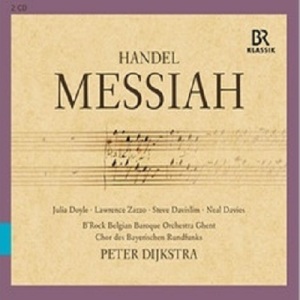[Re-post from 2016] No one would suggest that there should be no more performances of Handel’s Messiah in churches or concert halls because the work has already been done more than enough times. So if a group of performers and a record company want to record one of those performances and offer it to the CD-buying public, what’s wrong with that? No, we probably don’t need such a recording; but for fans and collectors, a new rendition of this timeless work, which, due to its many variables (solo voices, arias, size of forces, and stylistic approach) always is (technically) truly “new”, usually is worth a listen, and, in the hands of first-rate performers always offers rewarding moments if not complete satisfaction.
Yet, whatever your standard of satisfaction, it’s more than likely to be favorably met in this performance, primarily due to the superb chorus–and I mean really, really fine, which sings with the technical expertise, stylistic authority, and sheer vocal dynamism that rivals any choir of native English singers. Further, conductor Peter Dijkstra’s tempos are absolutely perfect, spirited in speed but delivered with super clear articulation and never seeming rushed or inelegantly pushed. The Belgian orchestra follows suit with vibrant sound and lively, uplifting playing. This is the way a Handel oratorio should be done.
As usual, judgements about the choice of soloists and their individual performances are open to one’s particular taste. For me, tenor Steve Davislim is as good as they come in his “Comfort ye…” and “Ev’ry valley…”–the latter a vigorous and vivacious exaltation that effectively sets the tone for the rest of the work. (Following this, I was happy to discover that this performance employs the tenor settings of the recit/aria sequence in Part 2, from “All they that see him” through “But thou didst not leave…”)
After her opening sequence of recits (“There were shepherds…”, etc.), in which she sounds strangely (dare I say) “girlish” (her imitation of an angel?), soprano Julia Doyle delivers an impressive, grown-up “Rejoice greatly”, with dazzling runs and turns and ornaments all-aglow. Bass Neal Davies has an annoying habit of singing behind the beat, and further suffers from the dreaded “ha-ha-ha” melismatic malady (“Thus saith the Lord…”), a deadly affliction in Handel; yet he nevertheless has a properly commanding presence that compels your attention.
But it’s Lawrence Zazzo’s lovely, rich, fluid countertenor that you most remember. The voice sounds absolutely natural (no throaty, hooty quality), and likewise his interpretations of arias such as “O thou that tellest…” and “He was despised”, so often merely interminable and tedious, are delivered with such clear beauty, heartfelt simplicity, and again, naturalness, that we truly hear them anew, and without even a fleeting urge to look at the clock.
Dijkstra understands the dramatic necessities and organizational demands of a large work of many and varied parts, and he brings it all together with managerial skill and interpretive insight comparable to the best on disc; the energized performers and charged ambience owe much to the benefit of the live concert setting, performances in Munich in November, 2014. I’ll never be one to say that the world has too many Messiah recordings, especially if the next new one is as good as this.
































